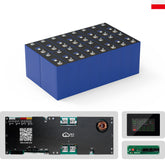How Long Will a 12V Battery Last When Paired with an Inverter
Battery Capacity and Type
The capacity of a 12V battery, measured in ampere-hours (Ah), directly impacts how long it can power an inverter. Common types include:
- Lead-Acid Batteries: Cost-effective but have limited deep-cycle performance.
- Lithium-Ion Batteries: Lightweight with high energy density and longer lifespan.
Load on the Inverter
The amount of power (watts) your devices draw from the inverter is a major determinant of battery runtime. Higher loads drain the battery faster.
Efficiency of the Inverter
Inverters are not 100% efficient and typically lose 5-15% of energy as heat during the conversion from DC to AC. A high-efficiency inverter will maximize battery runtime.
Depth of Discharge (DoD)
The depth to which a battery is discharged affects its longevity and available capacity. For example:
- Lead-Acid Batteries: Recommended DoD is 50% for optimal lifespan.
- Lithium-Ion Batteries: Can handle up to 80-90% DoD without significant degradation.
Environmental Conditions
Temperature extremes can reduce the performance of a 12V battery. Ideal operating temperatures are typically between 20°C and 25°C (68°F and 77°F).
- How to Calculate the Runtime of a 12V Battery with an Inverter
- Common Applications of 12V Batteries with Inverters
- Signs Your 12V Battery Needs Replacement
- Environmental Considerations for 12V Batteries
How to Calculate the Runtime of a 12V Battery with an Inverter
Basic Formula for Estimation
To estimate how long your 12V battery will last:
Runtime (hours) = (Battery Capacity in Ah × Battery Voltage × Inverter Efficiency) / Load in Watts
Example Calculation
- Battery Capacity: 100Ah
- Battery Voltage: 12V
- Inverter Efficiency: 90% (0.9)
- Load: 300W
Runtime = (100Ah × 12V × 0.9) / 300W
Runtime = 3.6 hours
Accounting for Depth of Discharge
For a lead-acid battery with a 50% DoD limit, the effective capacity is halved:
Runtime = (50Ah × 12V × 0.9) / 300W
Runtime = 1.8 hours
>>See also How Long Can An IPhone Last With 75% Battery Health
Common Applications of 12V Batteries with Inverters
Running Household Appliances
- Low-Power Devices: LED lights, fans, and small electronics can run for several hours.
- High-Power Devices: Refrigerators and air conditioners will significantly reduce runtime.
Off-Grid and RV Systems
12V batteries are a staple for off-grid setups and recreational vehicles (RVs), providing power for lighting, entertainment, and kitchen appliances.
Emergency Backup Power
During outages, a 12V battery and inverter combination can provide temporary power to essential devices like medical equipment or communication tools.
Tips to Extend the Runtime of a 12V Battery
Optimize the Load
- Use energy-efficient appliances to reduce power consumption.
- Turn off devices when not in use.
Choose the Right Battery
- For frequent deep discharges, opt for lithium-ion batteries.
- Use batteries with higher Ah ratings for longer runtimes.
Maintain the Battery
- Regularly check the battery’s state of charge.
- Clean terminals to prevent corrosion.
- Store in a temperature-controlled environment.
Invest in a High-Efficiency Inverter
Selecting an inverter with a high efficiency rating minimizes energy loss and maximizes battery runtime.
Signs Your 12V Battery Needs Replacement
Rapid Discharge
If the battery drains faster than usual, it may have reduced capacity.
Physical Damage
Swelling, cracks, or leaks indicate that the battery is no longer safe to use.
Failure to Hold a Charge
A battery that struggles to recharge or quickly loses charge needs replacement.
>>See also Group 36R Batteries Explained Dimensions Alternatives And Buying Tips
Environmental Considerations for 12V Batteries
Recycling and Disposal
Most 12V batteries are recyclable. Lead-acid batteries, in particular, have well-established recycling programs. Always dispose of old batteries at certified recycling centers.
Reducing Environmental Impact
- Use long-lasting lithium-ion batteries to reduce waste.
- Opt for solar charging systems to minimize fossil fuel reliance.
The runtime of a 12V battery paired with an inverter depends on multiple factors, including battery capacity, load, and inverter efficiency. By understanding these variables and adopting best practices, you can maximize the performance and lifespan of your 12V battery. Whether you’re using it for backup power, off-grid living, or recreational purposes, proper care and maintenance are essential for getting the most out of your investment. Calculate your power needs carefully and choose a high-quality battery and inverter setup to ensure reliable and efficient operation.
























Leave a comment
All blog comments are checked prior to publishing